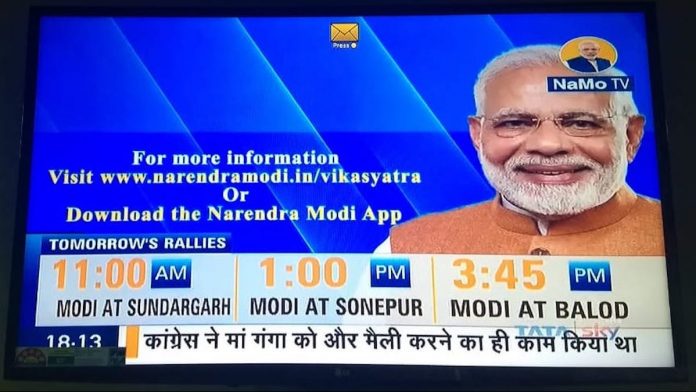
- 937Shares
New Delhi: The new Narendra Modi government is set to begin work on regulating ‘platform services’ like NaMo TV, offered by direct-to-home (DTH) television operators, as soon as it takes office.
Highly-placed sources in the information and broadcasting ministry told ThePrint that other priorities are set to include framing a national broadcasting policy and a regulatory framework for online news portals and over-the-top (OTT) platforms such as Netflix and Hotstar.
Platform services
The fact that the ministry is set to prioritise regulation of ‘platform services’ is significant, because that’s the reason it cited for its inability to crack down on NaMo TV, which had sprung up on DTH platforms in Lok Sabha election season, disappearing after the end of campaigning.
The ministry is set to draft a set of regulations for such ‘platform services’ and DTH platforms by bringing in amendments to the existing Cable Television Networks (Regulations) Act, 1995.
According to the existing act, no channel can be uplinked or downlinked from a satellite without a security clearance and a licence, but NaMo TV was operating without a licence from the ministry because platform services aren’t within its purview.
New broadcasting policy
A fresh broadcasting policy has also been long overdue. The Broadcasting Services Regulation Bill, drafted in 2006 to regulate private television and radio channels, was subsequently put in cold storage by the UPA-2 government after it caused a furore among broadcasters for its “draconian” and “ill-conceived” provisions.
While amendments are to be proposed to the Cable TV Act to handle the newer challenges of the television industry, there is a complete absence of any legal framework to regulate the booming private radio industry.
Sources told ThePrint that the new broadcasting policy will aim to tackle such challenges, given that the ministry will be holding the much-delayed private FM radio auctions in the next few months.
Online news & Netflix/Hotstar
The government could also formulate certain regulations for the proliferating number of news portals and OTT platforms. So far, OTT platforms like Netflix and Hotstar have resisted any regulation from the government, voluntarily signing a self-regulatory code of best practices. But discussions between the I&B ministry and other stakeholders have been underway for over a year, about an overarching regulatory mechanism for these platforms, news portals and issues related to cyber security among others.
National media communication policy
A national media communication policy is on the cards to streamline the government’s communication outreach measures, top government sources said.
The revision of the existing uplinking and downlinking guidelines for private television channels is also on the to-do list.
Older initiatives
The Prasar Bharati Act is also set to be amended to improve the segregation of power between the public service broadcaster and its two arms — All India Radio and Doordarshan.
The ministry is also set to finish the work of amending the archaic Cinematograph Act, 1952, and the Press and Registration of Books Act (PRB), 1867, which had been started in the Modi government’s previous term.
While a fresh Registration of Newspapers and Publications Bill, 2017, was ready for implementation after scrapping the PRB Act, it was later shelved. Similarly, a new draft of the Cinematograph Bill was also drawn up by the ministry after incorporating some recommendations of the Shyam Benegal committee on the revamp of the Central Board of Film Certification (CBFC), but it was also stalled.
The ministry is also set to work on implementing the ‘ease of doing business’ in the film industry and for private broadcasters. A few steps in this regard were taken by the previous government, but things were caught up in red tape.
A former secretary of the I&B ministry told ThePrint on the condition of anonymity that many of the proposed amendments to the old acts have been pending for a long time.
“The Cable TV Act is outdated, and it is inadequate to handle the present-day challenges posed by the TV industry. Also, the lack of any legal framework to regulate private radio channels will also need to be addressed on priority,” the official said, adding that these should have been put in place under the UPA itself.
Get the PrintEssential to make sense of the day's key developments
- 937Shares